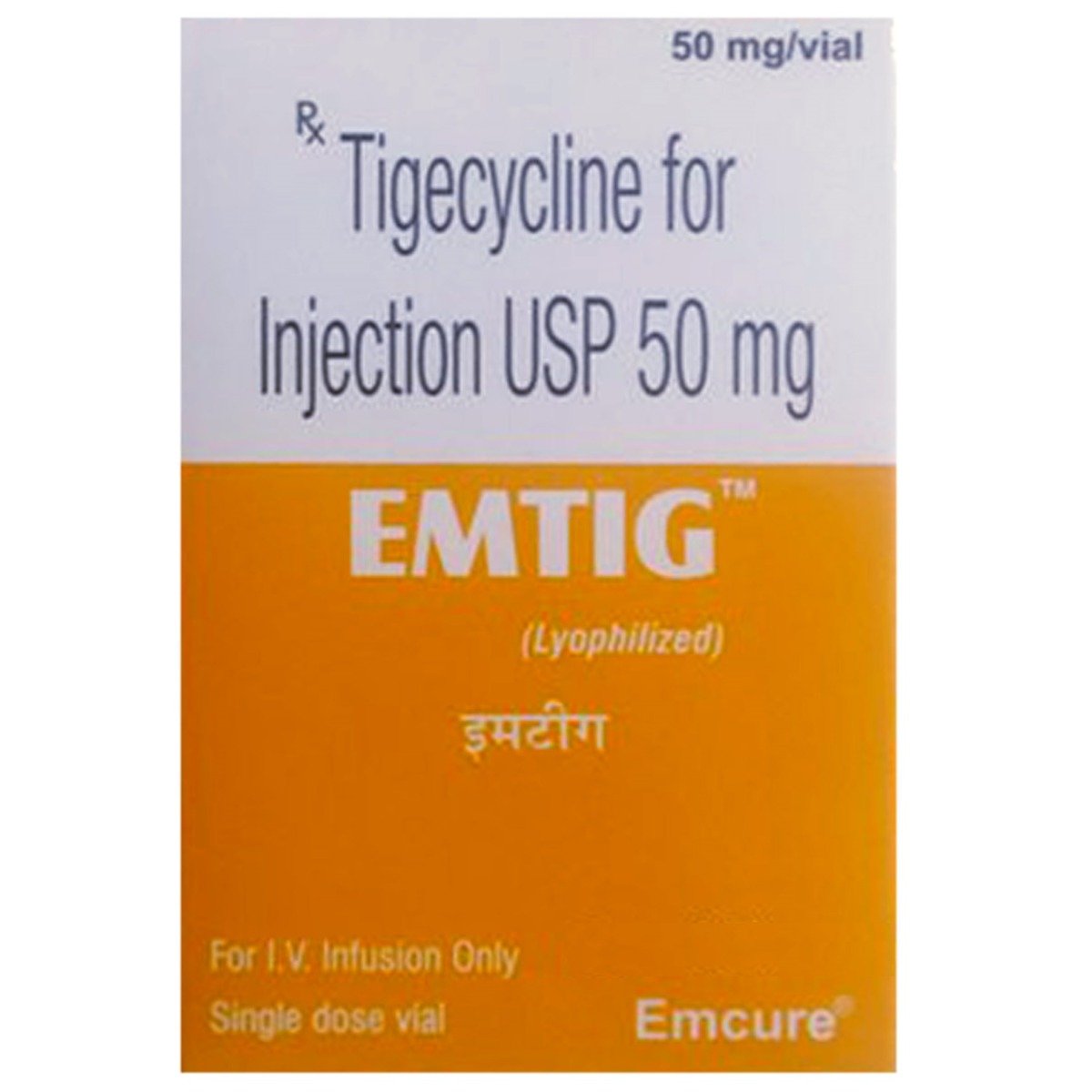Tigecycline
About Tigecycline
Tigecycline belongs to the class of 'antibiotics,' primarily used to treat bacterial infections like abdominal infections, community-acquired pneumonia (lung infection), and complicated skin and skin structure infections. Bacterial infection occurs when harmful bacteria grow in the body and causes illness. It can infect any part of the body and multiply very quickly. Tigecycline does not work for viral infections, such as common cold and flu.
Tigecycline contains 'Tigecycline' that belongs to the class of 'glycylcyclines'. It works by preventing the synthesis of bacterial proteins, which are the primary cursors for carrying out bacteria's vital functions. This process further inhibits bacterial growth.
Tigecycline will be administered by a healthcare professional; do not self-administer it. Your doctor will decide the dose and duration of Tigecycline based on your medical condition. Like all medicines, Tigecycline also causes side effects, although not everybody gets them. Common side effects of Tigecycline include nausea, vomiting, diarrhoea, headache, and abnormal liver function tests. If any of these effects persist or worsen, seek medical advice promptly.
Brief your medical history to the doctor if you are allergic to Tigecycline or any of its components. Let your doctor know if you have any kidney or liver diseases, colitis (inflammation of the inner lining of the colon), and pancreatitis (inflammation of the pancreas). Tigecycline is not recommended during pregnancy due to its harmful effects on the baby. It is advised to consult your doctor if you are breastfeeding before taking Tigecycline. Tigecycline can make you feel dizzy; hence drive or operate machinery only when you are alert. Tigecycline is not recommended in children below eight years of age.
Uses of Tigecycline
Medicinal Benefits
Tigecycline contains 'Tigecycline,' a broad-spectrum glycylcycline antibiotic that treats bacterial infections, such as abdominal infections, community-acquired pneumonia (lung infection), and complicated skin and skin structure infections. It works by preventing the synthesis of bacterial proteins, which are the primary cursors for carrying out bacteria's vital functions. Tigecycline is bacteriostatic and inhibits bacterial reproduction.
Directions for Use
Storage
Side Effects of Tigecycline
- Nausea
- Vomiting
- Diarrhoea
- Headache
- Abnormal liver function tests
Drug Warnings
Let your doctor know if you have any kidney or liver diseases, colitis (inflammation of the inner lining of the colon), and pancreatitis. Clostridium difficile-associated diarrhoea (CDAD) is reported during usage of antibiotics like Tigecycline. Therefore, please undergo an examination to rule out the chances of CDAD if you experience diarrhoea following Tigecycline therapy. Let your doctor know if you are undergoing any vaccinations with live bacterial vaccines (like typhoid vaccine) since Tigecycline may affect vaccines' activity. Tigecycline may induce photosensitivity and makes your skin more sensitive to the sun; hence apply sunscreen when you step out. Tigecycline is not recommended during pregnancy due to its harmful effects on the baby. Please seek medical advice if you are breastfeeding before taking Tigecycline. Tigecycline causes dizziness; hence drive or operate machinery only when you are alert. Tigecycline is not recommended in children below eight years of age.
Drug Interactions
Drug-Drug Interaction: Tigecycline may interact with anticoagulants (warfarin) and decrease the efficacy of oral contraceptives.
Drug-Food Interaction: Avoid alcohol intake while using Tigecycline.
Drug-Disease Interaction: Before taking Tigecycline, let your doctor know if you have any kidney or liver diseases, colitis and pancreatitis.
Drug-Drug Interactions Checker List:
Safety Advice

Alcohol
cautionAvoid taking alcohol while using Tigecycline since it may worsen the side effects.

Pregnancy
unsafeTigecycline is not recommended during pregnancy due to its harmful effects on the baby, including toxic effects on skeletal formation. Please consult your doctor before taking Tigecycline if you are pregnant or planning to conceive.

Breast Feeding
cautionIt is not known if Tigecycline is excreted into breast milk. Please consult your doctor before taking Tigecycline if you are breastfeeding.

Driving
cautionYou may experience dizziness as one of the side effects of Tigecycline. In such cases, do not drive or operate machinery until you feel better.

Liver
cautionLet your doctor know if you have any history of liver diseases before taking Tigecycline. Tigecycline should be used caution in cases of severe liver disease.

Kidney
cautionLet your doctor know if you have any history of kidney diseases before taking Tigecycline. Dose adjustment may be required.

Children
cautionTigecycline is not recommended for children younger than eight years old.
Habit Forming
Diet & Lifestyle Advise
- Include more fibre enriched food in your diet, as it can be easily digested by your gut bacteria, which helps stimulate their growth. Thus, fibre foods may help restore healthy gut bacteria after a course of antibiotics. Whole grains like whole-grain bread, brown rice should be included in your diet.
- Eating grapefruit during antibiotics treatment can prevent the body from utilizing Tigecycline properly. So, avoid intake of grapefruit or grapefruit juice with the antibiotic.
- Avoid taking too much calcium, iron-enriched foods and drinks as it might affect the working of Tigecycline.
- Avoid intake of alcoholic beverages with Tigecycline as it can make you dehydrated and affect your sleep. This can make it more challenging for your body to aid the Tigecycline in fighting off infections.
- Manage stress, eat healthily, drink plenty of water, exercise regularly, and get plenty of sleep.
- Do not walk barefoot at places like gym showers to prevent bacterial infections.
Special Advise
- Inform your doctor and laboratory staff in advance that you take Tigecycline if you are undergoing any medical examinations. Tigecycline can cause abnormal liver function test results.
- Renal, liver function and blood tests are advised during prolonged therapy to rule out any toxicity caused due to overdose of Tigecycline.
- Clostridium difficile associated diarrhoea (CDAD) is reported during the usage of antibiotics like Tigecycline. Please see your doctor if you experience prolonged diarrhoea.
Patients Concern
Disease/Condition Glossary
Bacterial infection occurs when harmful bacteria grow in the body and causes illness. It can infect any part of the body and multiply very quickly. Bacteria occur in three basic shapes: spherical, rod and spiral-shaped. Bacteria may be gram-positive (have thick cell wall) or gram-negative (do not have a cell wall). Some common symptoms of a bacterial infection include cough, fever and tiredness.
FAQs
Tigecycline contains Tigecycline, a broad-spectrum antibiotic that treats various bacterial infections. It works by inhibiting bacterial protein synthesis, which further inhibits bacterial growth.
Tigecycline can affect live vaccines like typhoid vaccine and decrease their effectiveness. Please consult a doctor before you start Tigecycline if you are undergoing any vaccinations.
Tigecycline can make your skin more sensitive to the harmful effects of sunlight. Hence it is advised to use sunscreen and wear protective clothing while using Tigecycline. It is also recommended to avoid tanning booths and sunlamps.
Diarrhoea can be a side-effect of Tigecycline. Drink enough fluids and eat fibre rich food if you experience diarrhoea. If you find blood in stools (tarry stools) or experience excess diarrhoea, consult your doctor. Do not take anti-diarrhoeal medicine on your own.





